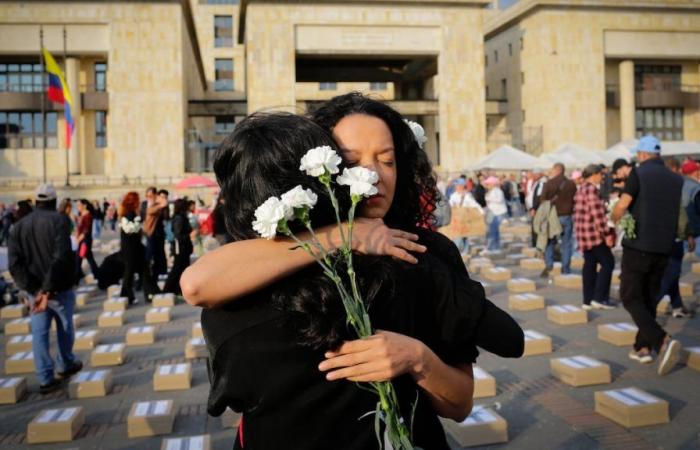
The complex situation of public order in Colombia is at a crossroads: the implementation of the Peace Agreement signed by the Government of Juan Manuel Santos and the extinct FARC seems abandoned to its fate, while President Gustavo Petro focuses on his policy of total peace , which seems disordered and uncertain. Human rights and security challenges throughout the national territory remain pressing, testing the State’s ability to consolidate peace and guarantee justice for all victims of the armed conflict and the civilian population in general.
The implementation of the Peace Agreement, between progress and serious challenges
Since the signing of the Peace Agreement in 2016, the State has made significant efforts in the economic and social reintegration of ex-combatants, as well as in the Comprehensive Rural Reform. According to the quarterly report of the secretary general of the United Nations Verification Mission in Colombia, 8,063 men and 2,815 women signatories have been involved in productive projects, and 82,014 hectares of land have been formalized for productive purposes. These advances are crucial for the stability and rural development of the country, and constitute a historical debt that is still far from being settled.
However, challenges persist and are alarming. Security remains a critical concern, with 416 murders, 37 disappearances and 137 attempted murders of social leaders and human rights defenders verified since the signing of the Agreement. The Special Investigation Unit of the Prosecutor’s Office has issued 513 arrest warrants for these crimes and has achieved 75 convictions, figures that show the constant danger for those who promote peace and justice. “What kind of peace are we building if human rights defenders continue to be easy targets of violence?” is one of the questions that resonates most in public opinion today. That famous phrase that several of us promulgated in the midst of the social outbreak does not lose validity: “they are killing us.”
In the area of transitional justice, the Special Jurisdiction for Peace (JEP) has made significant progress, with 151 indictments for war crimes and crimes against humanity, and an acknowledgment of responsibility by 89% of those accused. These achievements are fundamental for reconciliation and confidence in the Peace Agreement. However, these are insufficient advances if society does not address the structural causes of violence and if the State does not provide effective protection to those who are on the front line of implementation. Likewise, it is especially surprising to see that today Petrism, Uribism and the leaders of the signatories seem to agree on throwing darts at the Comprehensive System of Truth, Justice, Reparation and Non-Repetition (SIVJRNR) seeking to affect the legitimacy of not only the JEP, but also the Truth Commission and other institutions created with the Agreement.
Newsletter
The analysis of current events and the best stories from Colombia, every week in your mailbox
RECEIVE THE
Total peace, an excessive ambition without a coherent strategy
If implementation faces challenges, President Petro’s total peace policy seems misguided. With it, the Government has sought to expand dialogue with all armed actors in Colombia, but the rush to grant political status to armed groups such as the FARC dissidents (grouped in the so-called Central General Staff and Second Marquetalia), has generated confusion. and discontent among other actors, such as the ELN and the Gaitanista Self-Defense Forces of Colombia (AGC). This decision has undermined the peace strategy and complicated negotiations. How can we talk about total peace when we act with such improvisation and lack of coherence?
Law 2272 of 2022 established two clear routes: political negotiations with organized armed groups and judicial submission for high-impact criminal structures. The unification of various dissidents under an umbrella to which the Government has given a common political status has diverted this clarity, creating perverse incentives that discourage judicial submission. This confusion has weakened the authority of the State and complicated the implementation of total peace.
Meanwhile, armed groups have been increasing their presence and interference. According to data from Indepaz, the AGC or Clan del Golfo went from operating in 253 municipalities in 2022 to 392 municipalities in 2023; the EMC from 230 to 299, and the ELN from 189 to 23. These three groups are already present in approximately 40% of Colombian territory, affecting more than 8 million people. The lack of state presence and authority in these areas not only perpetuates insecurity, but also calls into question the Government’s ability to implement any peace policy.
A change of course is urgently needed
With the implementation of the Peace Agreement adrift and total peace aimless, it is not surprising that the human rights situation in Colombia remains alarming. The violence perpetuated by illegal armed groups such as the AGC and the ELN continue to weaken the social fabric and the capacity of the State to guarantee security in the territories. We cannot continue closing our eyes to the reality that policies are failing.
It is crucial that the Government strengthens the institutions responsible for the protection of human rights and the implementation of peace policies. Collaboration with civil society organizations can provide valuable perspectives and support in building more inclusive and effective strategies. Furthermore, it is essential to improve coordination and effectiveness in the implementation of these policies, ensuring that the Government’s actions are aligned with the objectives and principles of the Peace Agreement.
President Petro’s government must abandon grandiose rhetoric and focus on concrete and coherent actions that address the roots of violence. Improvisation and lack of clear strategy not only discredit peace efforts, but also endanger the lives of those who work tirelessly for a more just and peaceful country.
Subscribe here to the EL PAÍS newsletter about Colombia and here to the channel on WhatsAppand receive all the information keys on current events in the country.

